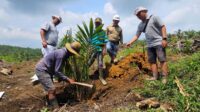PALMOILMAGAZINE, OSAKA — Indonesia’s Ministry of National Development Planning (Bappenas) has taken a strategic step to integrate national economic growth with environmental sustainability through a carbon trading partnership in the palm oil sector with the Chinese Society for Environmental Sciences (CSES).
The bilateral framework was discussed during the High-Level Meeting on the Preparation of Bilateral Cooperation between Bappenas and CSES on Innovative Development Financing through Carbon Trading in the Sustainable Palm Oil Industry, held at the Indonesia Pavilion, Expo 2025 Osaka, Kansai, Japan, on October 11, 2025.
“The memorandum of understanding between Indonesia and China will establish a comprehensive cooperation framework focusing on trade integration, technology, and sustainable environment — particularly through carbon trading in palm oil commodities,” said Teni Widuriyanti, Secretary of the Ministry of National Development Planning (Bappenas), in an official statement quoted by beige-heron-208544.hostingersite.com, Friday (October 17, 2025).
Also Read:
This collaboration aligns with the National Medium-Term Development Plan (RPJMN) 2025–2029, which emphasizes innovative development financing, palm oil downstreaming, and strengthening human resource and cooperative capacities. Its implementation will involve the development of low-emission technology innovations, including the Low Emission Palm Oil Mill (PaMER) and Controlled Emission Composting Chamber (CECC). These technologies aim to improve processing efficiency, reduce carbon emissions, and reinforce sustainable practices through technology transfer and training for farmers and cooperatives.
Although Indonesia already has a national carbon trading scheme, specific methodologies for the palm oil sector have yet to be developed. To address this gap, Bappenas is committed to supporting the creation of an emission reduction methodology tailored to the palm oil industry.
“This memorandum will help establish a standardized emission reduction methodology that aligns with global carbon market standards,” said Siliwanti, Expert Staff to the Minister of National Development Planning for Innovative Development Financing.
Also Read: Indonesian Government Cuts Subsidized Fertilizer Prices by 20%, Marking a New Era for Farmers
Bappenas and CSES will continue to strengthen coordination to ensure the memorandum of understanding and subsequent cooperation proceed effectively. Through this partnership, Indonesia aims to enhance its innovation capacity and green technology to support low-emission development.
“The adoption of low-emission technology will not only reduce carbon output but also open new opportunities for increasing national revenue through carbon credit trading — with China potentially becoming a major buyer,” concluded Teni Widuriyanti. (P2)





































